Monthly Archives: November 2017
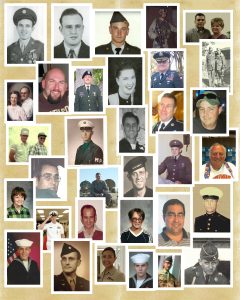 In a time when our nation is in such turmoil, I find myself appreciating our veterans even more than I did before. As a proud daughter of a World War II veteran, I always had a feeling of awe when it came to the members of our military. I never thought of a soldier without associating it with a hero, because that is what they are…each and every one of them. It takes the heart of a hero to set aside their own life, time with family, and their safety to protect the rights and lives of others…people they don’t know…who aren’t in their own country.
In a time when our nation is in such turmoil, I find myself appreciating our veterans even more than I did before. As a proud daughter of a World War II veteran, I always had a feeling of awe when it came to the members of our military. I never thought of a soldier without associating it with a hero, because that is what they are…each and every one of them. It takes the heart of a hero to set aside their own life, time with family, and their safety to protect the rights and lives of others…people they don’t know…who aren’t in their own country.
Soldiers are a special kind of hero. Like our first responders, they run into danger while others are running away, but a soldier does that in countries that aren’t their own. They have no stake in that country, but they know that without their help, the people of that nation are going to continue to live oppressed. The soldier fights for those who cannot fight for themselves. Evil dictators cringe when the soldiers are sent in, because there is a good possibility that the dictator’s days are numbered. War is never an easy journey for the soldier, but he or she knows that they are needed. They know that for every enemy death…a life is saved, and while that may be putting things a little bit simplistically, in a very real sense, it is true. In a war, the enemy must be beaten, in order to win the war, and thereby save the innocent.
Going off to war changes a person, and so does training to go to war. The minute a soldier joins up, there is a possibility of going to war, and the soldier has to face that fact. That’s where the heart of the hero kicks in. Deep down inside, the soldier has knows that what they are doing is important…it matters. Theirs is often a thankless job, and is sometimes treated with great disrespect, but when they are needed, they answer the call, nevertheless. It is our soldiers and their strength, that usually keeps our homeland free from attack. It’s not that we have never had attacks on our soil, but a strong, at the ready military force, makes our enemies think twice about trying to attack us here…and for that, I thank our military men and women. Our nation is very blessed to have our soldiers. To our active duty soldiers and our veterans of all wars, Happy Veterans Day!!
 Years ago, when the telephone first came out, the only way to call someone, if they had a phone, that is, was to go through the operator. Basically, you picked up your phone, and often, cranked a ringer to get the attention of the operator, and then told them who you wanted to talk to. The operator would then connect you with the person you were calling by way of a switchboard. Of course, that meant that the operator could also stay on the line and listen to the whole conversation, if she chose to do so. The switchboard operator was needed to make any call except if two people had a party line.
Years ago, when the telephone first came out, the only way to call someone, if they had a phone, that is, was to go through the operator. Basically, you picked up your phone, and often, cranked a ringer to get the attention of the operator, and then told them who you wanted to talk to. The operator would then connect you with the person you were calling by way of a switchboard. Of course, that meant that the operator could also stay on the line and listen to the whole conversation, if she chose to do so. The switchboard operator was needed to make any call except if two people had a party line.
Many people have no idea what a party line is, but my friend Gale Dugger Oskolkoff had one when her family lived in the Casper area, and her, her sisters, and I used to have a great time listening in on the calls that were made to a girl who had the unfortunate position of being a teenaged girl with a boyfriend and a party line. She use to get so mad at us. I don’t even know her name, but if she could have, I think she would have reached through the phone and choked us. Of course, I feel sorry for her now, because there was pretty much no privacy in her love life, but it was fun…for us anyway.
Before long, party lines became a thing of the past, and while direct distance dialing came into being before party lines went out, direct distance dialing was a brand new technology on November 10, 1951, when it was first offered on trial basis at Englewood, New Jersey, to 11 selected major cities across the United States. This service grew rapidly across major cities during the 1950s. The first direct-dialed long-distance telephone calls were possible in the New Jersey communities of Englewood and Teaneck. Customers of the ENglewood 3, ENglewood 4 and TEaneck 7 exchanges, who could already dial New York City and area, were able to dial 11 cities across the United States, simply by dialing the three-digit area code and the seven-digit number, which at the time consisted of the first two letters of the central office name and five digits. On November 10, 1951, Englewood Mayor M. Leslie Denning made the first customer-dialed long distance call, to Mayor Frank Osborne of Alameda, California.
The eleven destinations at that time were:

617: Boston, Massachusetts
312: Chicago, Illinois
216: Cleveland, Ohio
313: Detroit, Michigan
414: Milwaukee, Wisconsin
415: Oakland, California
215: Philadelphia, Pennsylvania
412: Pittsburgh, Pennsylvania
401: Providence, Rhode Island
916: Sacramento, California
318: San Francisco – San Francisco required the special code 318 for temporary routing requirements
Many other cities could not be included, as they did not yet have the necessary toll switching equipment to handle incoming calls automatically on their circuits. As with any technology, these changes take time to implement. Other cities still had either a mixture of local number lengths or were all still six-digit numbers. Montreal, Quebec and Toronto, Ontario in Canada, for example, had a mix of six and seven-digit numbers from 1951 to 1957, and did not have direct distance dialing until 1958. Whitehorse, Yukon, had seven-digit numbers from 1965, but the necessary switching equipment was not in place locally until 1972.

These days, all this seems completely archaic, considering the fact that even the phone lines that were installed on poles and underground are almost not necessary in today’s world. With the implementation of wireless…everything, we no longer need to have a phone line to have a phone, and in fact a home phone is not necessary for most people, because a cellular phone can be taken with us where ever we go, so we never need to miss a call, unless our work does not allow us to have the phone with us. Phones have come a long way since the days of switchboards, operators, and phone lines, and I think most of us would agree that it’s better now, although there are those who like to be disconnected.
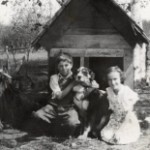
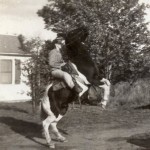 My Aunt Ruth Wolfe was raised on a farm, around horses, and she loved them, as well as most other animals. She really thrived on the country life. She worked hard, alongside her mom and siblings, especially during World War II, when her brother, my dad, Allen Spencer was serving in the Army Air Forces. She helped at the farm and also as a welder at the shipyards…one of the women known as riveters. Later in her life, when she was married, she and my Uncle Jim Wolfe lived in the country outside Casper, Wyoming. They gardened, canned, and raised farm animals. Aunt Ruth was one tough lady. She could do just about anything she set her mind to. From that hard work of farming, to canning, to haying, to playing any instrument, to painting, my Aunt Ruth was simply a multi-talented woman.
My Aunt Ruth Wolfe was raised on a farm, around horses, and she loved them, as well as most other animals. She really thrived on the country life. She worked hard, alongside her mom and siblings, especially during World War II, when her brother, my dad, Allen Spencer was serving in the Army Air Forces. She helped at the farm and also as a welder at the shipyards…one of the women known as riveters. Later in her life, when she was married, she and my Uncle Jim Wolfe lived in the country outside Casper, Wyoming. They gardened, canned, and raised farm animals. Aunt Ruth was one tough lady. She could do just about anything she set her mind to. From that hard work of farming, to canning, to haying, to playing any instrument, to painting, my Aunt Ruth was simply a multi-talented woman.
I think one of the strangest moves Aunt Ruth and Uncle Jim made was the one to Vallejo, California. I couldn’t quite figure out why a person who loved the country so much, would move to a city. Vallejo is a suburb of San Francisco, California, and very different from Casper, Wyoming or Holyoke, Minnesota. I suppose they decided that they wanted a change of pace, and I can understand that, because my family and I lived in the country for a number of years before we moved into town in Casper. For us, the city life was more…us, at least the small city life. I don’t think I would want to live in a big city like New York or San Francisco. Still, I can understand why my aunt and uncle might be drawn to the big city life, and the warmer California weather.
After a time in California, the quiet country life again drew them from the big city to the mountains of Washington state. I can’t say that the move to the mountains surprised me much, because it seems like country life was like the blood that ran through my aunt and uncle’s veins. It was a part of who they were, as 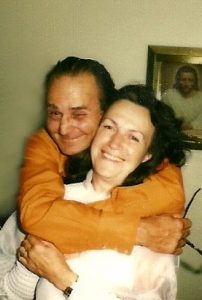
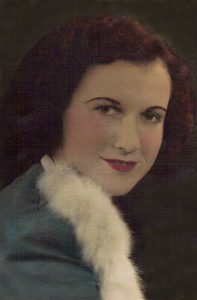 much as their DNA was who they were. Once they settled in eastern Washington, they never moved again. They bought the top of a mountain, and built three cabins there…one for them, one for their daughter, Shirley and her husband, Shorty Cameron; and one for their son Terry and his family. For Aunt Ruth and Uncle Jim, this would be their forever home. Having been on their mountain top, I can say that I understand why they thought it was so beautiful, but in the years since I moved back to town, I know that I would not want to live permanently in the country, or on a mountain top again. Nevertheless, that was their favorite place to be. Today would have been my Aunt Ruth’s 92nd birthday. It’s hard to believe she has been gone 26 years now. Happy birthday in Heaven Aunt Ruth. We love and miss you so very much, and can’t wait to see you again.
much as their DNA was who they were. Once they settled in eastern Washington, they never moved again. They bought the top of a mountain, and built three cabins there…one for them, one for their daughter, Shirley and her husband, Shorty Cameron; and one for their son Terry and his family. For Aunt Ruth and Uncle Jim, this would be their forever home. Having been on their mountain top, I can say that I understand why they thought it was so beautiful, but in the years since I moved back to town, I know that I would not want to live permanently in the country, or on a mountain top again. Nevertheless, that was their favorite place to be. Today would have been my Aunt Ruth’s 92nd birthday. It’s hard to believe she has been gone 26 years now. Happy birthday in Heaven Aunt Ruth. We love and miss you so very much, and can’t wait to see you again.
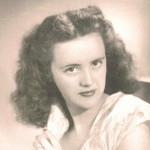 As my Aunt Evelyn Hushman’s birthday approaches, I wanted to look back to the years when she was growing up. She was the oldest of nine children, and so in many ways she became like a second mom to the younger kids…but, not exactly, in that my grandmother, Hattie Byer was a stay at home wife and mom all the years of her marriage. That was pretty much how it was in those days. I don’t know if shyness or being outgoing is something that a person is born with or not, but as the oldest child, with eight siblings, I seriously doubt if my Aunt Evelyn had the opportunity to be shy. And whatever the case on heredity might be, she certainly was not shy, but grew up to be a very outgoing person who had a wonderful circle of friends.
As my Aunt Evelyn Hushman’s birthday approaches, I wanted to look back to the years when she was growing up. She was the oldest of nine children, and so in many ways she became like a second mom to the younger kids…but, not exactly, in that my grandmother, Hattie Byer was a stay at home wife and mom all the years of her marriage. That was pretty much how it was in those days. I don’t know if shyness or being outgoing is something that a person is born with or not, but as the oldest child, with eight siblings, I seriously doubt if my Aunt Evelyn had the opportunity to be shy. And whatever the case on heredity might be, she certainly was not shy, but grew up to be a very outgoing person who had a wonderful circle of friends.
I think most of her family knows a lot about Aunt Evelyn as an adult, but I wanted to find out some things about her as a teenager, so I went looking on Ancestry and I was not disappointed. Ancestry has recently started putting the yearbooks from the schools on the site, and I found just what I was looking for there. As a senior, Aunt Evelyn was a part of the Junior Follies, which is a play put on by the senior class. The Follies at Natrona County High School began in 1925, and in the years that have followed, numerous student, alum, and community productions have graced the stage. The money made from the Follies was used to fund the prom. I never knew that my Aunt Evelyn was an actress…and, even if it was only for a short time, I 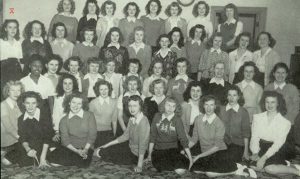 think it’s very cool, but not as cool as what I found next.
think it’s very cool, but not as cool as what I found next.
The second thing I found out about Aunt Evelyn…one that really doesn’t surprise me that much, because it is so very much in character for her, was that as a senior, she was a Big Sister. Now, I’m sure that you thought about her eight younger siblings, and thought, “Of course, she was! We knew that!” Her siblings are not the people I am talking about, however. In the late 1940s at Natrona County High School, there was a group of senior girls, all of whom were required to have a high three point grade average, and who possessed dependability and leadership skills. Being a part of a program like Big Brothers/Big Sisters, is something we have all heard about these days. It is a mentoring program. However, Big Sisters at Natrona County High School was a bit different than that. At the beginning of the school year, each of the Big Sisters were assigned three or four little sisters, who were sophomores. Basically the duties of a Big Sister were to give advise and help out in any way she can to make the transition from Junior High to High school a successful one for the little sisters. This aid might come 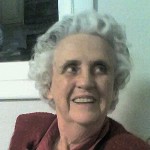 in the form of helping with Latin translation…or it could be help to find a date for the Co-Ed Ball, which was later named Football Ball. Many people who went by the Girls’ League room might have noticed Big and Little Sisters leaving notes on the bulletin board in the room…especially in the fall of the year. Of course, those notes were to ask or offer help with this or that, but many people wondered if the room was the Pony Express station, the post office, or the general exchange. They couldn’t have been more wrong, it was just a group of girls who were blessed enough to have a helper, or to be one. And, it makes me proud to know that my Aunt Evelyn was one of those amazing Big Sisters. Today would have been Aunt Evelyn’s 89th birthday. Happy birthday in Heaven, Aunt Evelyn. We love and miss you very much.
in the form of helping with Latin translation…or it could be help to find a date for the Co-Ed Ball, which was later named Football Ball. Many people who went by the Girls’ League room might have noticed Big and Little Sisters leaving notes on the bulletin board in the room…especially in the fall of the year. Of course, those notes were to ask or offer help with this or that, but many people wondered if the room was the Pony Express station, the post office, or the general exchange. They couldn’t have been more wrong, it was just a group of girls who were blessed enough to have a helper, or to be one. And, it makes me proud to know that my Aunt Evelyn was one of those amazing Big Sisters. Today would have been Aunt Evelyn’s 89th birthday. Happy birthday in Heaven, Aunt Evelyn. We love and miss you very much.
 I originally met my husband’s uncle, Andrew “Butch” Schulenberg at a family reunion about 1980, but really began to feel close to him and Aunt Charlys after my father-in-law, Walt Schulenberg, Butch’s half brother, passed away in 2013. Since that time, my husband, Bob and I have gone to Forsyth to spend time with them and kept in touch on Facebook. In those five years, I can honestly say that he has become a favorite uncle to me. He is very sweet man, and his kind, thoughtful ways have endeared him to me more than he could possibly know. I am so blessed that he is a part of my life.
I originally met my husband’s uncle, Andrew “Butch” Schulenberg at a family reunion about 1980, but really began to feel close to him and Aunt Charlys after my father-in-law, Walt Schulenberg, Butch’s half brother, passed away in 2013. Since that time, my husband, Bob and I have gone to Forsyth to spend time with them and kept in touch on Facebook. In those five years, I can honestly say that he has become a favorite uncle to me. He is very sweet man, and his kind, thoughtful ways have endeared him to me more than he could possibly know. I am so blessed that he is a part of my life.
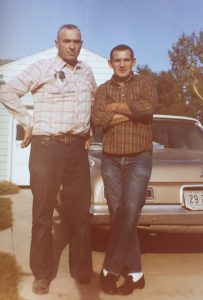 Uncle Butch is the youngest child of his dad, Andrew Schulenberg, who was the sheriff of Rosebud County, Montana from 1955 to 1972. Growing up as the son of the County Sheriff, you would expect that Butch would be an expert in guns, and you would be right, but not for the reason you might think. You see, Butch’s dad was known as the sheriff without a gun. Nevertheless, that didn’t stop Butch from becoming an expert marksman. Butch graduated from high school in Forsyth, Montana, and then attended Northern Montana College in Havre, Montana before joining the Army on September 13, 1963. Part of his time in the Army was spent stationed at Schofield Barracks, Hawaii, as a rifleman in Company A, 1st Battalion of the Division’s 35th Infantry. While there he took part in Exercise West Wind as a part of the assault team in a joint Army-Navy-Marine Corps amphibious operation on the Hawaiian Island of Molokai from April
Uncle Butch is the youngest child of his dad, Andrew Schulenberg, who was the sheriff of Rosebud County, Montana from 1955 to 1972. Growing up as the son of the County Sheriff, you would expect that Butch would be an expert in guns, and you would be right, but not for the reason you might think. You see, Butch’s dad was known as the sheriff without a gun. Nevertheless, that didn’t stop Butch from becoming an expert marksman. Butch graduated from high school in Forsyth, Montana, and then attended Northern Montana College in Havre, Montana before joining the Army on September 13, 1963. Part of his time in the Army was spent stationed at Schofield Barracks, Hawaii, as a rifleman in Company A, 1st Battalion of the Division’s 35th Infantry. While there he took part in Exercise West Wind as a part of the assault team in a joint Army-Navy-Marine Corps amphibious operation on the Hawaiian Island of Molokai from April 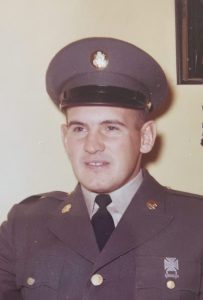 15, 1964 to April 24, 1964. During his time in the Army, Butch became an Expert (Rifle M-14) and Marksman (Rifle).
15, 1964 to April 24, 1964. During his time in the Army, Butch became an Expert (Rifle M-14) and Marksman (Rifle).
Butch had learned to respect the dangers of guns early in his life, a result of the fact that his dad lost his left leg as a result of a hunting accident at the tender age of 14. I don’t believe that Grandpa Andy Schulenberg was afraid of guns, else how could he possibly be the Sheriff of Rosebud County for so many years, but I do believe that he was well aware of what can happen with guns and that he made sure that his children knew that they were not a toy. Nevertheless, he didn’t teach his children to fear guns either. While Butch was an excellent marksman, he was also a great driver, and that caught the attention of his superior officer who chose him to be his driver for much of his time in the service. Butch received an honorable discharge on August 23, 1965. I am very proud of Uncle Butch’s service to his country, and his abilities. Today is Uncle Butch’s 77th birthday. Happy birthday Uncle Butch!! Have a great day!! We love you!!
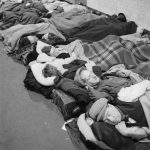 During World War II, the Germans began a bombing campaign, during the Battle for Britain, that was known as the Blitzkrieg, which means lightning war. The name was often shortened to the Blitz. The Blitz began on September 7, 1940 and would continue until May 1941. During these bombing raids, London was especially badly hit. At the start of the campaign, the government did not allow the use of underground rail stations as shelters, as they considered them a potential safety hazard. However, the people of London took the matter into their own hands and opened up the chained entrances to the tube stations. In the Underground they were safe from the high explosive and incendiary bombs that rained down on London night after night. With one or two exceptions, their confidence was rewarded. The City tube station was hit when a bomb went through the road and fell into it. Over 200 were killed, but for the most part the tubes proved to be good bomb shelters.
During World War II, the Germans began a bombing campaign, during the Battle for Britain, that was known as the Blitzkrieg, which means lightning war. The name was often shortened to the Blitz. The Blitz began on September 7, 1940 and would continue until May 1941. During these bombing raids, London was especially badly hit. At the start of the campaign, the government did not allow the use of underground rail stations as shelters, as they considered them a potential safety hazard. However, the people of London took the matter into their own hands and opened up the chained entrances to the tube stations. In the Underground they were safe from the high explosive and incendiary bombs that rained down on London night after night. With one or two exceptions, their confidence was rewarded. The City tube station was hit when a bomb went through the road and fell into it. Over 200 were killed, but for the most part the tubes proved to be good bomb shelters.
One eyewitness to the tube shelters said, “By 4.00 p.m. all the platforms and passage space of the underground station are staked out, chiefly with blankets folded in long strips laid against the wall – for the trains are still running and the platforms in use. A woman or child guards places for about six people. When the evening comes the rest of the family crowd in.” To start with the government underestimated the potential use of the underground stations. The government estimated that 87% or more of people would use the issued shelters…usually Anderson shelters…or spaces under stairs, and such. They assumed that only 4% of the population would use the underground stations. However, each night underground stations played host to thousands of families in London grateful for the protection they afforded. On November 8, 1940, a request 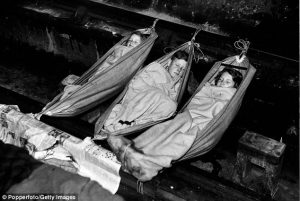 went out for blankets to aid the people sleeping in these underground tunnels. Times were hard in many areas of the London, and many Londoners spent their winter nights in the underground tunnels and shelters. Supplies of any new or old blankets that could be spared were called for in order to provide additional warmth for these people.
went out for blankets to aid the people sleeping in these underground tunnels. Times were hard in many areas of the London, and many Londoners spent their winter nights in the underground tunnels and shelters. Supplies of any new or old blankets that could be spared were called for in order to provide additional warmth for these people.
London went into mandatory blackouts every night to try to be invisible to the bombers. Despite the blackout restrictions, the Luftwaffe had a relatively easy way of getting to London. They simply followed the route of the River Thames, which also directed them to the docks based at the East End of the city. Each night, the bombers first dropped incendiary bombs designed to give the following bombers the most obvious of markers. After the incendiary bombs, came the high explosives. The government used its control over all forms of the media to present a picture of life going on as normal despite the constant nightly attacks. I suppose some would call this fake news, but it was the governments way of making it look like the Germans weren’t making any headway. They did not show photos of people known as trekkers, the families who would spend the night away from their homes, preferably in local woodland or a park where they felt safer from attack. Such photos were censored. An American film called “London can take it” presented the image of a city devastated by bombs, but one that carried on as normal. The narrator makes the point that “bombs can only kill people, they cannot destroy the indomitable spirit of a nation.”
However, we know that in reality, life was not quite as easy as propaganda showed. Indeed, London could take it, but only because there was little else they could do. Under wartime restrictions, people could not simply 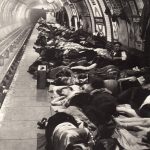 leave their homes and move elsewhere. The poorest in London lived in the East End, and it was this area that was especially hit hard by bombing because of the docks that were based there. However, most of the families there could do little else except stay where they were unless specifically moved by the government. These families developed what became known as a war-time spirit. They adapted their lives to the constant night-time bombing. By May 1941, 43,000 had been killed across Britain and 1.4 million had been made homeless. Not only was London attacked, but so were many British cities. Coventry and Plymouth were particularly badly bombed but most of Britain’s cities were also attacked, including Manchester, Glasgow, and Liverpool. Nevertheless, they were not broken.
leave their homes and move elsewhere. The poorest in London lived in the East End, and it was this area that was especially hit hard by bombing because of the docks that were based there. However, most of the families there could do little else except stay where they were unless specifically moved by the government. These families developed what became known as a war-time spirit. They adapted their lives to the constant night-time bombing. By May 1941, 43,000 had been killed across Britain and 1.4 million had been made homeless. Not only was London attacked, but so were many British cities. Coventry and Plymouth were particularly badly bombed but most of Britain’s cities were also attacked, including Manchester, Glasgow, and Liverpool. Nevertheless, they were not broken.
 My husband’s uncle, Eddie Hein has always been a soft-spoken man, who had a big impact on the lives of those around him. I remember the first time I met Eddie. I liked him and his wife, Pearl very much. They were kind and welcoming, and to this day, we love to go to visit them in Forsyth, Montana, although we don’t get to go nearly as often as we used to. Before his retirement, Eddie worked long, hard hours at the Peabody coal mine in Colstrip, Montana. It was shift work, and it was hard on the body, but Eddie made a good living and supported his family well. The long hours always seemed twice as long as they were…especially at the end of a long week of them.
My husband’s uncle, Eddie Hein has always been a soft-spoken man, who had a big impact on the lives of those around him. I remember the first time I met Eddie. I liked him and his wife, Pearl very much. They were kind and welcoming, and to this day, we love to go to visit them in Forsyth, Montana, although we don’t get to go nearly as often as we used to. Before his retirement, Eddie worked long, hard hours at the Peabody coal mine in Colstrip, Montana. It was shift work, and it was hard on the body, but Eddie made a good living and supported his family well. The long hours always seemed twice as long as they were…especially at the end of a long week of them.
Coal mining was Eddie’s occupation, but it was not his life…not his heart. His heart belonged to his family. Eddie remodeled their home largely by himself, and did a beautiful job. Eddie worked hard, alongside Pearl, of course, weeding their garden, and growing their vegetables, and then canning the vegetables for use all year long. It was a project they did together, especially after Pearl went to work too. Eddie and Pearl were always there to help their friends and neighbors too. People only had to call, and they would do whatever was needed. I suppose that is just the way it is in a small town, but more likely it is just they way they are. Eddie and Pearl are very helpful people, just ask anyone.
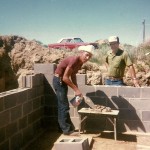
Eddie has always loved tractors. He was always working on one or two, and there were always tractors in their back yard. He used them to help friends with their haying, or digging something for someone when needed. I’m sure he used them in their own garden too, because you can’t really have a successful garden if you don’t plow it and such. My husband, Bob remembers those tractors well, but then I guess he would. It’s kind of a guy thing, and being a mechanic, just like his Uncle Eddie, working on tractors would have a draw for him too. I’m sure those tractors gave them lots to talk about, and I know that they both enjoyed those visits very much. Today is Eddie’s 74th birthday. Happy birthday Eddie!! Have a great day!! We love you!!
 In the early years of politics in the United States, the political parties had different names than they do these days. Of course, with the additional parties we have now, it is an ever changing political scene, with the lesser parties visible, but unlikely to win the office of President of the United States…at least for now. The First Party System of the United States featured the Federalist Party and the Democratic-Republican Party (also called “Democratic-Republican” or “Jeffersonian Republican”), these were in place from 1792 to 1824. The Whig Party, led by Henry Clay, that grew from the National Republican Party, and the Democratic Party, led by Andrew Jackson, were in play from 1828 to 1854. The Third Party System stretched from 1854 to the mid-1890s, and was characterized by the emergence of the anti-slavery Republican Party (nicknamed “GOP”), which adopted many of the economic policies of the Whigs, such as national banks, railroads, high tariffs, homesteads and aid to land grant colleges. It was into this time-frame that President Abraham Lincoln entered office.
In the early years of politics in the United States, the political parties had different names than they do these days. Of course, with the additional parties we have now, it is an ever changing political scene, with the lesser parties visible, but unlikely to win the office of President of the United States…at least for now. The First Party System of the United States featured the Federalist Party and the Democratic-Republican Party (also called “Democratic-Republican” or “Jeffersonian Republican”), these were in place from 1792 to 1824. The Whig Party, led by Henry Clay, that grew from the National Republican Party, and the Democratic Party, led by Andrew Jackson, were in play from 1828 to 1854. The Third Party System stretched from 1854 to the mid-1890s, and was characterized by the emergence of the anti-slavery Republican Party (nicknamed “GOP”), which adopted many of the economic policies of the Whigs, such as national banks, railroads, high tariffs, homesteads and aid to land grant colleges. It was into this time-frame that President Abraham Lincoln entered office.
Abraham Lincoln was elected the 16th president of the United States over a deeply divided Democratic Party, becoming the first Republican to win the presidency. Lincoln received only 40 percent of the popular vote but handily defeated the three other candidates…Southern Democrat John Breckinridge, Constitutional Union candidate John Bell, and Northern Democrat Stephen Douglas, a United States senator from Illinois. Lincoln, a Kentucky-born lawyer and former Whig representative to Congress, first gained national stature during his 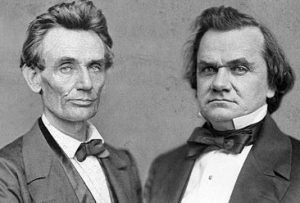 campaign against Stephen Douglas of Illinois for a United States Senate seat in 1858. The senatorial campaign featured a remarkable series of public encounters on the slavery issue, known as the Lincoln-Douglas debates, in which Lincoln argued against the spread of slavery, while Douglas maintained that each territory should have the right to decide whether it would become free or slave. Lincoln lost the Senate race, but his campaign brought national attention to the young Republican Party. In 1860, Lincoln won the party’s presidential nomination.
campaign against Stephen Douglas of Illinois for a United States Senate seat in 1858. The senatorial campaign featured a remarkable series of public encounters on the slavery issue, known as the Lincoln-Douglas debates, in which Lincoln argued against the spread of slavery, while Douglas maintained that each territory should have the right to decide whether it would become free or slave. Lincoln lost the Senate race, but his campaign brought national attention to the young Republican Party. In 1860, Lincoln won the party’s presidential nomination.
I find it very odd that today’s Democrats try to take credit for racial equality, when history proves that the opposite was true. When we look at the wars and the votes by the party numbers, it is easy to see that the Democratic party has long been the one trying to keep racial injustice going in this country. In fact, it was Lincoln’s anti-slavery views that caused the secession of seven southern states in protest, because they wanted to keep their slaves. Now, many people are wanting to tear down the statues that were erected to the heroes of the south…all Democrats, and it is the Democratic Party that is leading the fight. In my opinion, it is like tearing yourself apart from the inside. The Democratic Party, in an effort to appear to be the ones trying to obtain equal rights for all races, is, on the outside anyway trying to appear to agree, while on the inside, they are just trying to take eyes off of their own underhanded agenda. I don’t know how I feel about the removal of those statues, but I don’t like that the Republicans and Conservatives are being blamed for the initial placement of the statues.
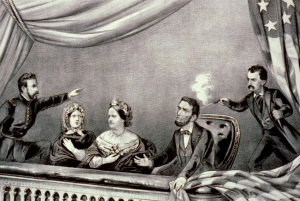
In 1863, as the tide turned against the Confederacy, Lincoln emancipated the slaves and in 1864 won reelection. In April 1865, he was assassinated by Confederate sympathizer John Wilkes Booth at Ford’s Theatre in Washington DC. The attack came only five days after the American Civil War effectively ended with the surrender of Confederate General Robert E. Lee at Appomattox. For preserving the Union and bringing an end to slavery, and for his unique character and powerful oratory, Lincoln is hailed as one of the greatest American presidents. And amazingly…at least to the Democrats, he was a Republican.
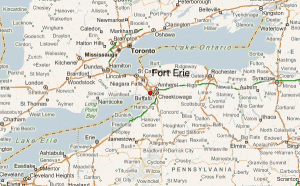
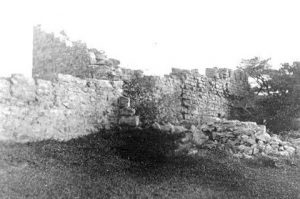 Part of the War of 1812 involved a border dispute between the United States and British North America, which is present-day Canada. During the war, the Americans launched several invasions into Upper Canada, at the point of present-day Ontario. One section of the border where this was easiest, because of communications and locally available supplies, was along the Niagara River. Fort Erie was the British post at the head of the river, near its source in Lake Erie. In 1812, two American attempts to capture Fort Erie were bungled by Brigadier General Alexander Smyth. Bad weather or poor administration halted the American efforts to cross the river, and Fort Erie remained in British hands.
Part of the War of 1812 involved a border dispute between the United States and British North America, which is present-day Canada. During the war, the Americans launched several invasions into Upper Canada, at the point of present-day Ontario. One section of the border where this was easiest, because of communications and locally available supplies, was along the Niagara River. Fort Erie was the British post at the head of the river, near its source in Lake Erie. In 1812, two American attempts to capture Fort Erie were bungled by Brigadier General Alexander Smyth. Bad weather or poor administration halted the American efforts to cross the river, and Fort Erie remained in British hands.
In 1813, the Americans won the Battle of Fort George at the northern end of the Niagara River. At this point, the British abandoned the Niagara frontier and allowed Fort Erie to fall into American hands without a fight. Unfortunately, the Americans failed to follow up their victory, and later in the year they withdrew most of their soldiers from the Niagara to furnish an ill-fated attack on Montreal. This allowed the British to recover their prior positions and to mount raids which led to the Capture of Fort Niagara and the devastation of large parts of the American side of the Niagara River.
For 1814, a new invasion of Upper Canada was planned under the command of Major General Jacob Brown. Originally aimed at Kingston on Lake Ontario, it was switched to the Niagara because British ships controlled Lake Ontario for the first six months of 1814. The United States finally captured Fort Erie in 1814. It was thought that the British, while outnumbered, surrendered Fort Erie prematurely…at least in the view of the British commanders. They fully expected the outnumbered British troops to stand and fight…to the death, if need be. Because American troops were already concentrated at Buffalo and Black Rock, the attack was to be launched across the southern part of the Niagara frontier. Fort Erie was the first objective that stood in the way, and so, its capture was required. Lieutenant General Gordon Drummond, the British commander in Upper Canada, hoped that the garrison at Fort Erie could at least buy him enough time against the American invasion to concentrate his forces. Major Thomas Buck was given command of the fort with a garrison of 137 British soldiers.
Brown’s force crossed into Canada on July 3, 1814. Brigadier General Winfield Scott landed a mile and a half north of the fort with a brigade of regulars while it was still dark. Another brigade under Eleazar Wheelock Ripley crossed the head of the river to the south of the fort, a little behind schedule due to fog. Meanwhile, New York militia demonstrated opposite Chippewa to distract the British troops in the area. As Scott’s and Ripley’s forces approached Fort Erie, Buck fired only a few shots at the Americans from the fort’s cannon and then surrendered. The Americans had captured an important fort at little cost. The fort’s garrison had bought the British very little time and Buck was later court martialed for his hasty surrender.
From their new base at Fort Erie, Brown next marched up the Niagara River and met the British at the Battle of Chippewa. The British commander at Chippewa, Major General Phineas Riall, believed that the garrison of Fort Erie was still holding out, which contributed to his decision to launch a hasty and ill-fated attack. Following the Battle of Lundy’s Lane in July, British forces under the command of Gordon Drummond advanced and unsuccessfully attempted to besiege the fort. After that it remained in American hands until the American commanders decided to abandon the fort, which was evacuated and blown up in November 1814. These days, with so many historic forts across the nation, it was shocking to me to read that they had blown up the fort, 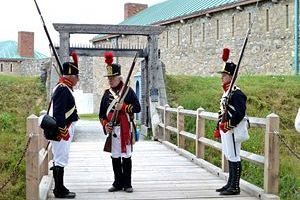
 but I guess they weren’t interested in the historic side of things…they were making history. The fort, which had been built by the British in 1764, was restored, and was incorporated as a village in 1857. It became a town when it merged with Bridgeburg in 1932. Fort Erie is now the site of a large horse-racing track and has steel, aircraft, automotive, paint, and pharmaceutical industries. It is a town with a population of 29,960 in 2011.
but I guess they weren’t interested in the historic side of things…they were making history. The fort, which had been built by the British in 1764, was restored, and was incorporated as a village in 1857. It became a town when it merged with Bridgeburg in 1932. Fort Erie is now the site of a large horse-racing track and has steel, aircraft, automotive, paint, and pharmaceutical industries. It is a town with a population of 29,960 in 2011.

 With each passing year, we imagine what Laila might have been like. Seven years ago today, my niece, Jenny Spethman and her husband, Steve welcomed their first daughter into the world. The birth was one of happiness and concern. Their daughter was not well. Her heart was not properly formed…a condition called Hypoplastic Left Heart Syndrome, had left her left ventricle underdeveloped. Little Laila would go to Heaven just 18 days later, and just like that, her little life on earth would be over…but not her memory. No, her memory will live forever in the hearts and minds of her parents, grandparents, siblings, and the rest of her family. It’s amazing to me that a child I never got to meet could continue to impress my mind, and the minds of the entire family, with pictures of who she might have become.
With each passing year, we imagine what Laila might have been like. Seven years ago today, my niece, Jenny Spethman and her husband, Steve welcomed their first daughter into the world. The birth was one of happiness and concern. Their daughter was not well. Her heart was not properly formed…a condition called Hypoplastic Left Heart Syndrome, had left her left ventricle underdeveloped. Little Laila would go to Heaven just 18 days later, and just like that, her little life on earth would be over…but not her memory. No, her memory will live forever in the hearts and minds of her parents, grandparents, siblings, and the rest of her family. It’s amazing to me that a child I never got to meet could continue to impress my mind, and the minds of the entire family, with pictures of who she might have become.
At 7 years of age, I can picture the little first grader she would be now. In my minds eye, I can picture her little face with the changes that seven years would bring. I can imagine her laughter, very much like her little sister, Aleesia’s, and a personality to match. I think that when a child is lost, the family tends to look at other children who are the same age that lost child would be, and it is so easy to place the lost child in the same activities, looks, and personalities. Of course, it’s not exact, how could it be, but it’s enough to truly imagine what the lost child would be like at each age. That’s how it is with Laila. It’s how we can imagine the little girl she would be.


Laila left us far too soon, but her memory will live in our hearts forever. From her, we learned not to take life for granted. We learned to take the pictures of even the littlest, most insignificant event, because it may end up being very important. We have learned to spend time with those we love, and to tell each other how much we love each other. We will see Laila again in Heaven, but for now, we all miss her very much. Today would have been Laila’s 7th birthday. Happy birthday in Heaven Princess Laila. We love you.

